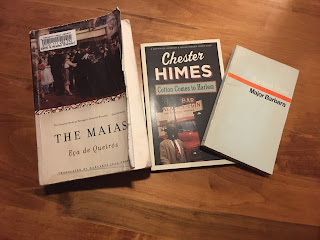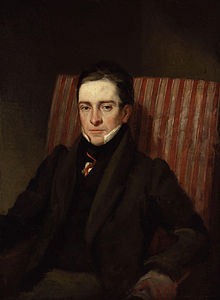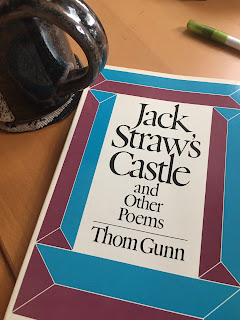"Love is a god, my children; he is young, beautiful, and winged; and so he enjoys youth, pursues beauty, and makes souls take wing. Zeus has not so much power as he has; he rules the elements; he rules the stars; he rules his fellow gods--"
 |
| François Gérard's Daphnis and Chloe |
And Eros looks out for his favorites, and that includes Daphnis and Chloe.
Daphnis and Chloe are probably better known through painting these days than through Longus' original novella, which is kind of a shame. (Though the paintings can be a lot of fun!) I found the above painting with a bunch of other Daphnis and Chloe paintings here. A nice selection, and by no means complete--it's easy to find more, including a series by Marc Chagall.
But Longus is the originator of the story. Nothing is known about him, though it's assumed he lived on Lesbos, where the story happens. He probably wrote it around 200 A.D. It's a work of great charm.
At the very beginning the narrator sees a painting:
"I saw the most beautiful sight I have ever seen, in a grove that was sacred to the Nymphs: a painting that told a story of love."
The narrator asks around, learns the story in the painting, and decides to write it down as an offering to the gods.
You can see why this appealed to painters.
We know from the start that Daphnis and Chloe are special: the slave goatherd Lamon finds Daphnis when his goat keeps running off to a thicket. Lamon investigates and discovers his goat suckling the infant Daphnis; next to Daphnis are tokens that indicate he was well-born: a purple cloak and a tiny sword. Lamon and his wife Myrtale decide to adopt the boy, but hide the signs of noble parentage. The name they give him, Daphnis, indicates a rustic origin. (And hopefully hides his true parentage.)
Two years later something very similar happens with an infant girl, except that the nurturing animal is a ewe. Her tokens are golden sandals and anklets. She's raised by Dryas and Nape (pronounced with two syllables) who give her the equally rustic name Chloe.
Flash forward to when Daphnis is fifteen and Chloe thirteen. Both adoptive fathers have a dream (which they don't communicate to each other) that their wards are meant to be out of doors herding where they will each be touched by the arrow of Eros. And so Daphnis and Chloe are trained in the arts of their respective herding specialties. And so the two of them are out in the fields with their sheep and their goats--and each other. And so...they fall in love. It's Chloe who falls first; Daphnis stumbles into a pit-trap dug for a wolf, he's fine, but muddy, and with Chloe nearby takes off his clothes to wash up in a spring.
"And that thought was the beginning of love. She didn't know what was happening to her: she was a young girl brought up in the country and hadn't even heard of anyone speak of love... 'Now I feel ill, but I don't know what my illness is; I feel pain, although I've not been injured; I feel sad, although I've lost none of my sheep; I feel hot, although I'm sitting in deep shade. How many times I've been scratched by brambles and I've not wept! How many times I've been stung by bees, and I've not cried out!'"
She's lost none of her sheep! And still!
Don't worry: Daphnis' turn comes soon enough.
Oh, there's threats to their love: Dorcon, the cowherd, falls for Chloe, tries to win her over, then win over her adoptive father, and then finally resorts to more violent means. Pirates raid the coast, stealing the livestock, but see Daphnis and decide he would be the better prize. Daphnis inadvertently starts a war between Mytilene and Methymna, the two main cities on Lesbos, and Chloe is captured and carried off. Gnathon, the hanger-on of the estate's owner, falls in lust with Daphnis and persuades that owner to give him Daphnis as his personal slave.
All resolved most satisfactorily. But you never really doubted that, did you? And that's what you wanted all along, wasn't it? 😉
Even the villains, so long as they're named--Dorcon and Gnathon and one or two others--are redeemed, in their way, in the end. Though some anonymous pirates do die.
Anyway, like I said, ridiculously charming.
There's some lit-crittery things I could possibly say, about ecphrasis, or how each of its four chapters corresponds to a season, suitable enough for an agricultural poem, or how it derives from the twin fountainheads of Theocritus and Greek new comedy (Menander, later echoed in Plautus and Terence, and then Shakespeare's Comedy of Errors), but nah...
Oh, and while I'm not perfectly sure I should admit this: but, without leaving the house. I could come up with five different translations, and only one of them I found online. I've been quoting from Christopher Gill's, which appears in Collected Ancient Greek Novels, edited by B. P. Reardon. I'd previously read the story (I'm pretty sure) in a translation by Moses Hadas in Three Greek Romances (1953). It's not bad:
"A god is Eros, my children, young and handsome and winged. Therefore does he take pleasure in youth, and he pursues beauty and he endows souls with wings. He possesses greater power than Zeus himself. He rules the elements; he rules the stars; he rules his fellow deities;..."
W. D. Lowe renders in 1908. (I have it in an Ayer reprint):
"Love, my children, is a god, youthful, handsome, winged; and so his pleasure is in youth, his chase is beauty, his task to wing man's soul. None has such power, not Zeus himself. He rules the elements, rules the stars and rules his fellow-gods..."
I rather like this, especially 'to wing man's soul'.
My older Loeb edition, with translation by Stephen Gaselee in 1916, gives:
"Love, my children, is a God, a young youth and very fair, and winged to fly. And therefore he delights in youth, follows beauty, and gives our fantasy her wings. His power's so vast that that of Jove is not so great. He governs in the elements, rules in the stars, and domineers even o'er the Gods that are his peers."
That old Loeb not only has 'young youth'--argh!--but also changes the name of Dorcon (bad enough, but accurate) to Dorco, which I'm afraid just makes me laugh. (Hey you, Dorko!) It's not completely crazy: a Roman would likely enough translate the original Greek of Dorcon to Dorco in Latin, but it *is* just a wee bit unfortunate in English...
All these would appear to be out of print, though the Loeb series has a new version of Daphnis and Chloe with a translation by Jeffrey Henderson I haven't seen.
The novella is also available at Project Gutenberg, which is probably the easiest one to come by, in a translation by Rev. Rowland Smith:
"My young friends, he is a god, young, beautiful, and ever on the wing. He rejoices, therefore, in the company of youth, he is ever in search of beauty, and adds wings to the souls of those he favours. He has power far beyond that of Jove himself. He commands the elements, and he rules the stars, and even the gods themselves, who are otherwise his equals;..."
Whew...that's a lot of Love. 😉
Looking at my Greek text (I have one of those, too...) I see I was supposed to have read about a quarter of it in Greek for a class once upon a time. Based on some penciled-in vocabulary notes, it's possible I even did my homework...
Anyway, it's 50-70 pages depending on the edition, making it too short really to be a novel, but a little long for a short story, and so...
Also I've not managed to visit Greece yet this year:
"Apples do not give off such fragrance, nor do pears. But I'm frightened of kissing her. Her kiss stings my heart..."






























